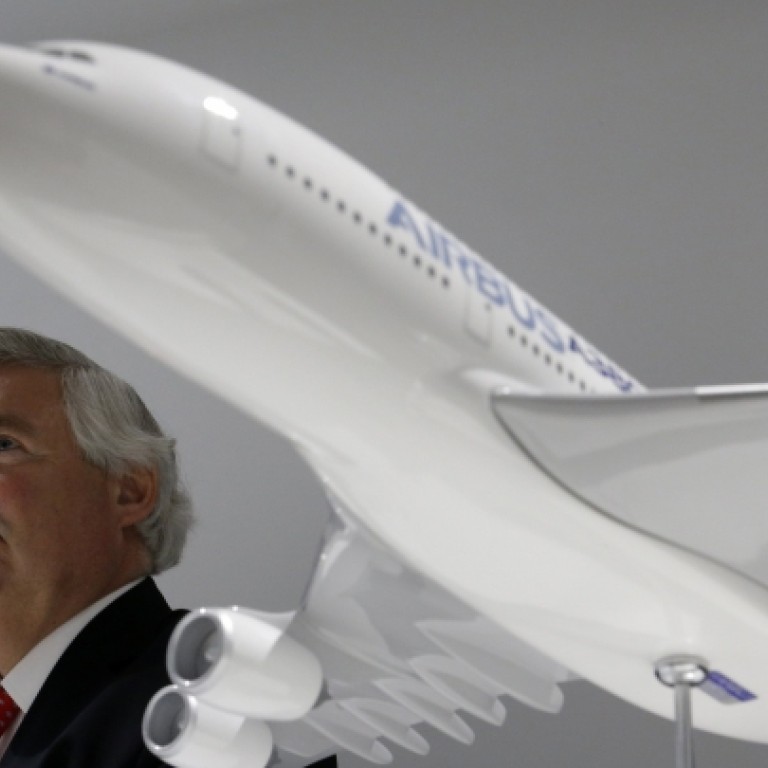
Airbus wins order battle at Paris Airshow
Airbus clinches deals for 90 more planes on Thursday to lift orders and commitments to 466 aircraft worth US$69 billion at list prices
Last-minute orders swept Airbus to victory over Boeing at a Paris Airshow marked by stormy weather and hot debate over the next generation of big jets.
European planemaker Airbus clinched deals for 90 more planes on Thursday, taking its orders and commitments at the world’s top aviation fair to 466 aircraft worth US$69 billion at list prices.
US arch-rival Boeing said it had won firm and provisional orders for 442 aircraft valued at more than US$66 billion.
The complexity of the US$100 billion-a-year jetliner industry, mixed with promotional tactics on both sides, blurred the number of genuinely new deals. But participants said Airbus won the day after losing ground to Boeing last year.
“The rain brought us some very good luck,” said Airbus Chief Executive Fabrice Bregier.
EADS-owned Airbus pushed back its traditional end-of-show roundup to enable it to squeeze out a final wave of orders from Hong Kong Aviation Capital, Spirit Airlines and United Airlines.
United, which earlier this week became one of the launch customers for Boeing’s new 787-10 Dreamliner model, signed a firm deal for Airbus’ competing A350-1000 aircraft worth US$3.3 billion.
Airbus said a smaller launch model, the A350-900, had successfully completed its second flight on Wednesday and would perform a fly-by when the aviation jamboree opens to the public on Friday.
French President Francois Hollande is expected to witness the fly-by after hitching a ride to the show aboard an Airbus A400M airlifter.
Barring more bad weather, the ceremonial flights are expected to lift a sombre mood left by days of torrential rain at the 50th Paris Airshow, held every other year at Le Bourget.
Airbus and Boeing clashed over wide-body jet strategy as orders for the world’s largest airliners dominated the show.
The A350 and 787 Dreamliner are competing in a US$1 trillion market for jets made mainly of carbon-composites.
Boeing this week launched a larger version, the 323-seat 787-10, designed for airlines needing to carry more passengers without all the range of modern jets, for example within Asia.
Airbus said it was offering a version of its A350 optimized for the same kind of trip by tuning the engine to less thrust.
But the main showdown came over the market for large twin-engine airplanes at or above 350 sets, known as mini-jumbos.
That is a profitable niche for Boeing, with its 365-seat 777-300ER. The 350-seat A350-1000 aims to compete with the 777-300ER.
In response, Boeing has started marketing a revamped version with up to 406 seats, tentatively known as the 777X.
Boeing claims its proposed successor to the 777-000ER is 20 per cent more efficient per seat, a comparison that Airbus claims is boosted by squeezing in passengers more tightly.
Industry sources say Boeing’s marketing materials assume 9-abreast seating for the current model and 10 for the new model.
Boeing supporters say the aircraft would still have superior economics even without any change in layout, and that the 777’s wider cabin makes it more comfortable for very long trips.
Airbus sales chief John Leahy dismissed the 777X as a “paper plane” and said the A350-1000 was being sold with firm guarantees on performance.
The A350-1000 is due to enter service in 2017; the 777X is expected to enter service around the end of the decade.
Leahy also doubts whether Boeing’s design for a plane with expensive new wings and engines would work in the marketplace.
“We doubt that Boeing is going to build the airplane as you see it today. It’s a paper airplane,” he said.
Boeing accused Leahy of recycling weak arguments.
“He labelled the 787 a paper plane. He was wrong about the 787, and Airbus has spent seven years and billions of euros to play catch-up,” Boeing spokesman Charlie Miller said in an email.
Analysts say the war of words is just beginning. It will dominate the run-up to November’s Dubai Airshow, where Emirates airline, which wants to replace up to 175 current-generation 777s, is tipped as a major customer.

